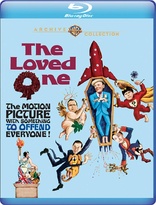The Loved One Blu-ray Movie
HomeThe Loved One Blu-ray Movie 
Warner Archive CollectionWarner Bros. | 1965 | 121 min | Not rated | May 09, 2017
Movie rating
6.6 | / 10 |
Blu-ray rating
| Users | 2.5 | |
| Reviewer | 2.5 | |
| Overall | 2.5 |
Overview
The Loved One (1965)
An aspiring young British poet goes to work at a Hollywood pet cemetery, after falling in love with an ethereal girl who works at the premier burial spot for the rich and famous, in a satire on the film business, the funeral industry, military contracting, real estate developers -- and more.
Starring: Robert Morse (I), Jonathan Winters, Anjanette Comer, Dana Andrews, Milton BerleDirector: Tony Richardson
| Dark humor | Uncertain |
| Comedy | Uncertain |
Specifications
Video
Video codec: MPEG-4 AVC
Video resolution: 1080p
Aspect ratio: 1.78:1
Original aspect ratio: 1.85:1
Audio
English: DTS-HD Master Audio 2.0 Mono (96kHz, 24-bit)
Subtitles
English SDH
Discs
Blu-ray Disc
Single disc (1 BD)
Playback
Region A, B (C untested)
Review
Rating summary
| Movie | 1.5 | |
| Video | 4.5 | |
| Audio | 4.0 | |
| Extras | 1.0 | |
| Overall | 2.5 |
The Loved One Blu-ray Movie Review
Bury My Heart at Whispering Glades
Reviewed by Michael Reuben May 21, 2017Rocky relationships between filmmakers and Hollywood aren't uncommon, but Tinseltown's
conflicts with British director Tony Richardson were unusually tempestuous. In 1961, after
successful English films that included Look Back in Anger with
Richard Burton and The
Entertainer with Laurence Olivier, Richardson was enticed to America to helm a screen
adaptation of a William Faulkner novel with assurances of complete control, only to discover
upon arrival that none of his conditions would be met. The director left in a huff, declaring that
"[i]t is impossible to make anything interesting or good under the conditions imposed by the
major studios in America".
But three years later, after Richardson had won the Best Picture and Best Director Oscars for
producing and directing Tom Jones, he returned with greater clout to
oversee MGM's screen
version of Evelyn Waugh's satirical novel, The Loved One. This time, the studio left him alone,
but the production was beset by conflict from within, including an ongoing battle between
Richardson and his cinematographer (and co-producer) Haskell Wexler, over how the film
should be shot. Plagued by delays and cost overruns, the film died at the box office, and
Richardson once again returned to England and his own production company, where he spent
most of his remaining career. He did, however, have the satisfaction of watching numerous
studio executives depart the film's initial screening in grim silence, a reaction that Richardson
reportedly greeted with delight.
The novel on which The Loved One is based is a short satire written after its author's trip to
Hollywood, where he attended a funeral at Forest Lawn and was struck by parallels between the
pretensions of the movie industry and the lavish overproduction of the L.A. funeral business. The
book is laced with the kind of acidly condescending sarcasm that is a British specialty, but
Richardson made the odd decision to hire an American screenwriter, Terry Southern, the
notorious author of Candy, whose temperament and style
were the antithesis of Waugh's and
who had recently lent his anarchic sensibility to Dr. Strangelove. Although Richardson did pair
Southern with a British co-writer, he chose Christopher Isherwood, author of the stories that
would inspire Cabaret and, perhaps not
coincidentally, one of Evelyn's Waugh's chief literary
rivals. At the time, Richardson was quoted as saying that Waugh's novel was “thin and dated”—a remark that did not endear the production to the
author, who condemned the film
even before it was finished.
The result of this ill-conceived collaboration is a cinematic train wreck, an overstuffed satire that
can't make up its mind about what it's satirizing because it's so busy extending a middle finger
to everyone watching. (The film's ad campaign promised something to offend everyone, and it
was accurate.) Like many celluloid white elephants, The Loved One has garnered a cult following
over the years, and for those fans the Warner Archive Collection now offers the film on Blu-ray
in a sterling new transfer so beautifully rendering the film's black-and-white imagery that you'd
never know how, behind the camera, the director and cinematographer were routinely at each
other's throats.
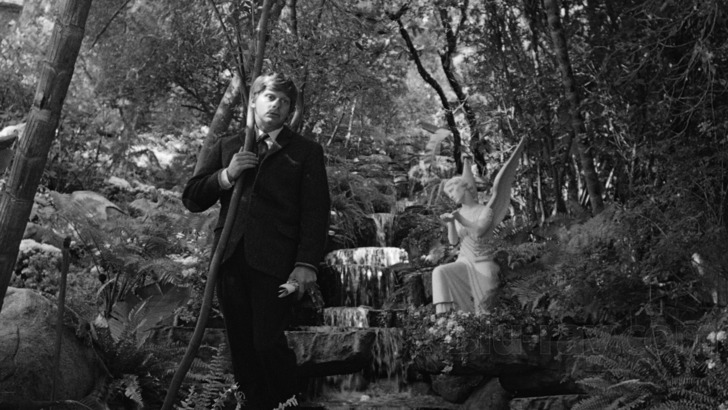
Waugh's novel began with a pair of British ex-pats sharing a home in Los Angeles, but in Richardson's film, they've been converted into uncle and nephew. The uncle is Sir Francis Hinsley (John Gielgud), an English painter of minor renown who has found a more exciting livelihood as an art director for the movies. The nephew is Dennis Barlow, a directionless young man who arrives from London on a plane ticket he won by chance. Dennis is played by a youthful Robert Morse, the American actor best known today as Bert Cooper, the ad agency's elder statesman on Mad Men. Morse's British accent was so unstable during filming that he had to loop all of his lines in post-production, a handicap that gives an extra kick to the film's running joke about an actor (Robert Easton) who's being drilled in British pronunciation to play James Bond but can't seem to overcome his Southern drawl.
The Loved One spends its first half hour mocking the film industry, with Roddy McDowall as an unctuous studio executive at Megalopolitan Pictures and Jonathan Winters as a hyperkinetic producer. It also parodies English class-consciousness, which is dutifully preserved by the L.A. ex-patriot conclave under the leadership of Sir Ambrose Ambercrombie (Robert Morley), who has been knighted for his services as an actor specializing in butlers and prime ministers. After that first half hour, the script performs a series of sideways maneuvers to ease Dennis Barlow into a job at a fancy pet cemetery called Happier Hunting Grounds. In the process, Dennis becomes familiar with the A-list cemetery for humans, Whispering Glades, which is owned and operated by Reverend Wilbur Glenworthy (also Jonathan Winters) in an ostentatious and quasi-religious style that exerts cult-like control over its employees.
One of Whispering Glades' most devoted workers is the beautiful and ethereal Aimee Thanatogenous (Anjanette Comer), with whom Dennis falls deeply in love. Unfortunately for Dennis, Aimee is already in love with her boss, the facility's chief embalmer, Mr. Joyboy (Rod Steiger)—and unfortunately for Aimee, Mr. Joyboy only has eyes for his corpse clientele and his aging mother (Ayllene Gibbons). In desperation, Barlow gives Aimee poems that he claims to have written himself but in fact has plagiarized from such well-known sources as Keats and Shakespeare. Now a bundle of conflicted emotions, Aimee seeks advice from a newspaper columnist, Guru Brahmin, whom she doesn't know is really a gruff, cynical and perpetually soused reporter (Lionel Stander), who, when cornered in a bar, is perfectly capable of telling a desperate soul that killing oneself is a viable option.
But wait, there's more! At Whispering Glades, Rev. Glenworthy is running out of burial space, and he conceives a plan to extract more profit from the land by converting it into retirement homes, emptying the graves by blasting their occupants into space. The rocketry will be provided by a child prodigy, 12-year-old Gunther Fry, who is played by diminutive 25-year-old actor and musician Paul Williams (the future demonic Swan in Phantom of the Paradise). The first person to receive a space burial is, appropriately, an astronaut nicknamed "The Condor", and his precedent-setting service is complicated by a web of deceit and blackmail. (Fry and his rocketry were added for the movie, and it's the kind of goofball device that bears the unmistakable stamp of Terry Southern's authorship.)
The Loved One is never boring, as it rapidly cycles through subplots, characters and wildly inconsistent acting styles, but its scattershot mockery never achieves the focus of Waugh's original satire. The best way to watch it is to ignore the plot altogether and let yourself be entertained by the frequent grotesqueries—the scenes featuring Mr. Joyboy and his gluttonous mother are worthy of John Waters—and the long list of cameos by famous actors (who are even listed as "cameo guest stars" in the opening credits). Here's James Coburn as the immigration officer who stamps Barlow's passport! Here's Milton Berle as a wealthy Angeleno who wants his dog buried at Happier Hunting Grounds! Here's Dana Andrews as a corrupt Army general! And here's Liberace, without a sequin or spangle in sight, as Whispering Glades' "counselor", gently advising the bereaved on coffins and funeral attire with the enthusiasm of a wedding planner! As each guest star appears, The Loved One momentarily pauses to dwell upon them, as if boasting about the marquee names it managed to attract. But then the moment is over, and the film's whacko machinery resumes its forward lurch toward . . . what? In perhaps unintentional anticipation of its director's fate, the film ends with Dennis Barlow returning to England from his American adventures. He's a sadder man, but certainly no wiser.
The Loved One Blu-ray Movie, Video Quality 
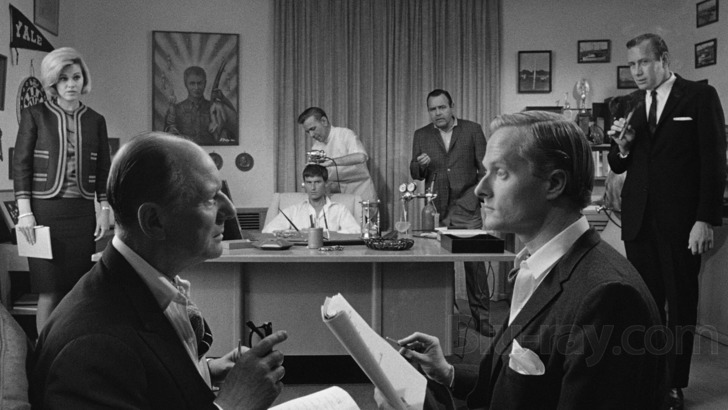
Haskell Wexler would win an Oscar for his next film, Who's Afraid of Virgina Woolf?, where his
collaboration with director Mike Nichols must have been a relief after his epic battles with The
Loved One's director over how to shoot in black-and-white. Notwithstanding their
disagreements, what ended up on the screen is an expressive image that beautifully renders both
the obscene opulence of Whispering Glades and the quotidian dullness of Dennis Barlow's
private struggles. For this 1080p, AVC-encoded Blu-ray, the Warner Archive Collection
commissioned a new scan of a fine-grain master positive that was recently struck from the
original camera negative for preservation purposes. The scan was performed at 2K by Warner's
Motion Picture Imaging facility, followed by appropriate color-correction and cleanup.
The result joins WAC's growing catalog of lustrous B&W images, with exceptional depth and
clarity. Even without color, the extravagance of the production design is memorable,
and the Blu-ray renders it with impressive sharpness and detail. Blacks are solid, shades
of gray are finely delineated, and the film's grain pattern is finely resolved. The Loved One's plot
may be a mess, but it's image on Blu-ray remains clean and tightly focused. To ennsure a
superior presentation, WAC has mastered The Loved One as its usual high average bitrate, here
just a fraction under 35 Mbps, with a superior encode.
The Loved One Blu-ray Movie, Audio Quality 
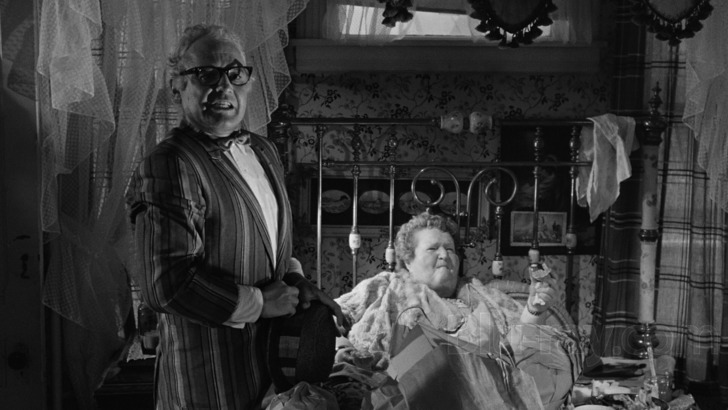
The Loved One's mono track has been taken from the original magnetic master, cleaned of any age-related defects and encoded on Blu-ray in DTS-HD MA 2.0. It's a dialogue-heavy track, with occasional attention-grabbing effects, many of them associated with Gunther Fry's rocketry. For the film's mocking score, director Richardson turned to his frequent collaborator, British composer John Addison, who had just won an Oscar for scoring Tom Jones.
The Loved One Blu-ray Movie, Special Features and Extras 
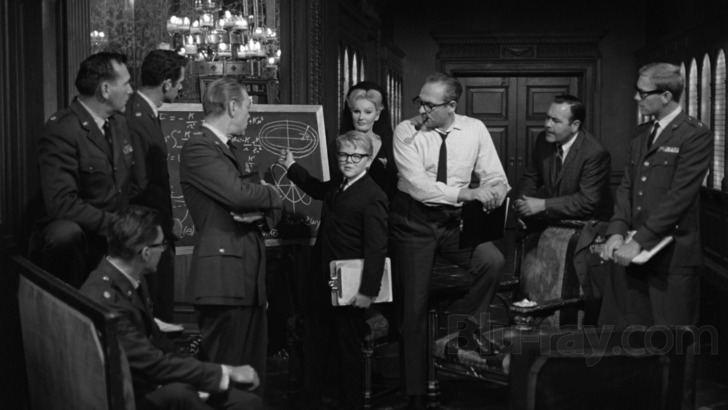
The extras have been ported over from Warner's 2006 DVD of The Loved One. The trailer has
been remastered in 1080p.
- Trying to Offend Everyone (480i; 1.33:1; 15:12): This 2003 featurette offers recollections of the film's production by a scattered group of surviving participants, but it only hints at the film's troubled history. Interviewees include Robert Morse, Anjanette Comer, Paul Williams, Haskell Wexler and Tony Gibbs, who is described as "supervising editor", although the film's editing credit is divided between Hal Ashby (future director of Being There) and Brian Smedley-Aston (a member of the editorial team on Performance).
- Trailer (1080p; 1.78:1; 4:33): One can imagine MGM's PR department sitting around a table and asking themselves, "How do we sell this thing?"
The Loved One Blu-ray Movie, Overall Score and Recommendation 
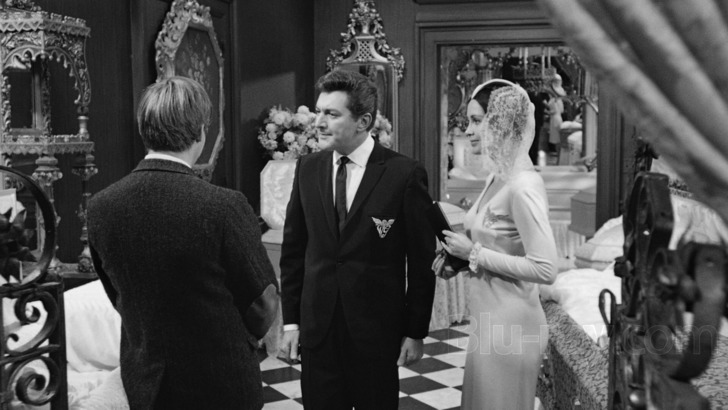
The Loved One is a mess, but it exercises a strange fascination that is the classic hallmark of a
cult film. Fans will love WAC's first-rate presentation, but newcomers should proceed with
caution.
Similar titles
Similar titles you might also like

The Wheeler Dealers
Warner Archive Collection
1963

The Hallelujah Trail
2K Restoration
1965

Come Blow Your Horn
1963

What's New Pussycat?
1965

Cold Turkey
1971

In Like Flint
Limited Edition to 3000 - SOLD OUT
1967

The Love God?
The Don Knotts Collection
1969

Greaser's Palace
1972

Rustlers' Rhapsody
1985

Jayne Mansfield's Car
2012

The Brass Bottle
1964

Bachelor in Paradise
Warner Archive Collection
1961

It's In the Bag
1945

The Hero
2017

The Last Remake of Beau Geste
1977

Skidoo
1968

The Life and Times of Judge Roy Bean
1972

The End
1978

Rachel and the Stranger
Warner Archive Collection
1948

Grace Quigley
1985
